DI AI Strategy Summit
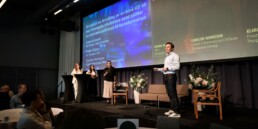
DI AI Strategy Summit - Showcasing the AI Twin!
On stage showcasing our AI Twin of a publicly listed CEO!
May 20th was a big one! We were invited to Dagens industri’s AI Strategy Summit to present one of our most ambitious innovations yet — the AI Twin of Fredrik Ruben, CEO at Dynavox Group AB, which we’re proud to be building together.
Together with Caroline Henricson, we spoke about this bold experiment on how AI can extend positive leadership presence, scale human impact, and catalyze strategy realization.
In many organizations, the Success DNA of the company — purpose, strategy, culture, and business — lives in the heads and hearts of a few individuals who easily become bottlenecks. The CEO is often one of them. And while leaders like Fredrik want to be present for every employee, that simply is not possible. Especially during rapid growth.
That’s where the AI Twin comes in.
By decoding the unique experiences, knowledge, thought patterns, and behaviors of the individual leader — and combining that with the organization’s Success DNA — the AI Twin can reach out with questions to support reflection, give input and share critical knowledge, as well as nudging everyday behaviors that strengthen both performance and wellbeing.
We are deeply grateful to Fredrik and Dynavox for their courage and curiosity, and we believe this is a perfect match for the innovation. There’s more to it than the fact that they happen to be our customer — and we’ll share more about that next week. But until then, a quote from Fredrik:
“I believe we need to experiment with AI in new ways, and I’m open to the possibility that this might fail. But honestly, I think it’s much more dangerous not to try. That I do something uncertain like this in my role as a CEO — I hope it sends a strong signal to the organization that experimenting is how we learn. So far, I’m impressed by my AI Twin. I’ve seen real value in its responses — from how to plan a town hall to navigating sensitive topics in relation to the global turbulence. Also, it has great taste in music!”
Thank you, Felicia Fazzi and Hanna Moisander, for inviting us and for offering such a unique platform to share a different perspective on AI. We truly learned a lot from the other speakers, and sharing the stage with Anton Osika from Lovable was a privilege — and a powerful reminder that behind every entrepreneur, there’s a human being. How do we build a high-performing business world where both people and business thrive?
Meet AI-Klara
MEET MY AI TWIN!
The first time my AI twin stepped in for me, I was out on a long run—my sacred thinking space. Running gives, me clarity, distance, and inspiration. When I stopped after the run and checked my phone, I was shocked.
Felicia Grosin had asked my AI twin for advice on a challenging project meeting—the exact kind of thing I had been trying to step away from. And the answer? It was me. On a good day.
As a CEO and founder, you paradoxically risk becoming the bottleneck of your own success. Your time is limited, your impact is capped, and your ability to scale yourself is constrained.
But experimenting with my own AI twin has given me a sense of hope that being a CEO can be different—supporting individuals and the team in meetings I can’t attend but where I’m needed, both internally and externally, assisting with onboarding new colleagues, and ensuring that the success DNA of People Heart Business isn’t lost.
Already, John Airaksinen—who had a great idea in the middle of the night—could get immediate feedback while I was sleeping. And, another time, get feedback on something he was proud of and wanted to talk about, while I was picking up the kids.
When I see what “I” have responded, I’m often impressed. Sometimes, I even catch myself quoting my AI twin. Because again—it is me… on a good day.
And it helps me reflect on my own behavior. One time I saw the reply from AI-Klara to a question on how I follow up colleagues after important meetings – 30 minutes after I had done just this. Lucky for me, on this occasion I checked four of the five boxes AI-Klara mentioned (which is not always the case).
My AI twin won’t replace me, but what if it could support my colleagues and offload 30% of my workload? That would free up time for higher-value creation—both at work and beyond.
We see this as a key puzzle piece in driving a truly human-centric AI transformation—where technology enhances, rather than replaces, our uniquely human abilities and contributions. That’s why it’s critical to decode and scale the traits, behaviors, and values that create real impact.
Yes, it is a bit scary to create these AI-twins, but honestly it is scarier to look at the leadership that is winning power around the world. We need to scale high performing leaders with the heart in the right place.
Leaders who successfully balance financial performance, societal impact, and people-centric leadership are rare—but more necessary than ever.
That’s why we’re thrilled to be working with a bold CEO of a publicly listed company to build an AI twin—not to replace him, but to scale his leadership, decision-making, and impact.
We don’t want to scale just anyone – who would you want to create a twin of?
(My partner already made it clear— at home, one Klara is enough! 😉)
Sustainable Performance - Podcast Under 15
15 MINUTES TO RETHINK SUSTAINABLE PERFORMANCE - AND WHY IT'S CRITICAL FOR BUSINESS SUCCESS!
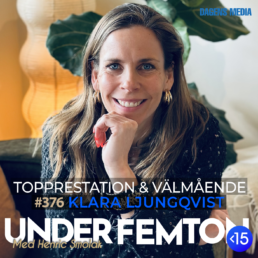
We had the pleasure of our CEO, Klara Ljungqvist, joining the podcast Under 15 with the fantastic Henric Taub Smolak to discuss the story behind People Heart Business, how we support brave CEOs of Unicorns, publicly listed companies, and UN initiatives in building sustainable, high-performing organizations, and our mission to revolutionize the business world.
What impact does your workplace leave behind? Do employees leave work energized, or do they bring home stress and exhaustion? And how does that affect business and society in the long run?
Why are we convinced that sustainable performance is a strategic necessity for business success?
Listen as Klara and Henric explore the connection between business-critical challenges and the need for a more human-centric approach—proving that top performance and well-being aren’t contradictions, but the key to the future of work.
Read more in Dagens Media and listen to the podcast episode here.
Lead the Future 2024

LEAD THE FUTURE 2024
Societal challenges and mounting pressure on leaders call not only for bold action but also for true humanity. In November, we gathered brave leaders who dare to break norms and redefine the future of business. In a room filled with business leaders, entrepreneurs, researchers, elite athletes, and rising stars – people who might never otherwise meet – we came together to connect, share, reflect, and lead.
What made this evening so special wasn’t just the impressive titles of those present but the openness and vulnerability that filled the room. From the very start, we delved into the core of what it means to be a leader and a human in a world that demands more from us every day.
Talking about openness:
- A CEO of 10,000 employees shared the raw truth of what it feels like to lose the role.
- Another CEO shared how success turned upside down with a profit warning, a threatening obsessive litigant, and the fear of being unable to protect his family.
- A national talent in sustainability revealed how hard it can be to live up to the ideals she champion, from loving life to battling the darkest of thoughts.
We want to create a space for bold and transparent conversations – not just about business strategy or successes but about our dreams, doubts, and the bravery required to break norms in the business world.
We explored the intersection of AI and humanity, how technology can elevate human-centric leadership. We confronted the reality of making bold decisions that often go unrewarded in the short term – would we risk our job to do what’s right?
We believe that these are the kinds of discussions that ignite change. Leadership today isn’t just about driving results; it’s about taking responsibility for the world we shape. It’s about fostering transparency, empathy, and the kind of connection where people share more openly with strangers in one evening than with longtime colleagues.
This night was proof that when diverse people and perspectives unite, we find the energy and inspiration to keep marching forward. We need leaders who challenge the status quo, who redefine what’s possible, and who make bold, human-centric choices.
To everyone who joined us: Thank you for your honesty, your bravery, and your belief in what leadership can and should be. This wasn’t just an event; it is part of a movement – shaping the future.
Student Event 2024
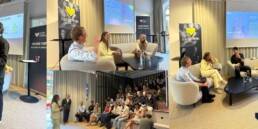
Student Event 2024
A dream came true when People Heart Business arranged an event gathering students from Handelshögskolan i Stockholm, Kungliga Tekniska högskolan, and Psychology students. We believe this was the first event of its kind. Or to be honest, other companies have probably gathered these people before, such as Tinder, SATS and Sturehof, but it is rare in a business context. Despite Kahneman winning the Nobel Prize in Economics for psychological research over 20 years ago, these perspectives remain fairly siloed in business.
The world faces both significant opportunities and challenges that will shape our future. Business leaders must address complex problems, contributing to a better tomorrow and successful businesses. These multifaced challenges require diverse perspectives for CEOs to navigate effectively. The students collaborated in diverse teams by advising a CEO in a hypergrowth or stagnating company, impressing us with their insights, teamwork, and joy of working together.
In a panel discussion with executives passionate about top performance, leadership, and wellbeing, we gained valuable insights from their experiences and impressive achievements, but also from showing vulnerability as leaders.
⭐Tom Englund, COO at Instabee, discussed the transformative impact the company has had on last-minute deliveries and people’s lives, reducing the need to wait for packages. He shared how Instabee’s bold CO2 emission targets put pressure on competitors to do the same, resulting in a visible reduction to Sweden’s overall emissions. Tom also candidly addressed the personal and organizational achievements and challenges of managing hypergrowth.
⭐Emma Korn, Chief Transformation Officer at Djerf Avenue, highlighted how the company has challenged the fashion industry with the ambition of creating a safe space online. She praised founder Matilda Djerf’s genius as a designer and entrepreneur, her integrity in never compromising on values, and the continuous effort to ensure every customer counts. Emma emphasized the importance of speaking one’s mind and remaining open to challenges, sharing how these values have been crucial to her own success.
This event showcased the power of uniting perspectives to solve complex challenges. We are inspired by the insights shared by the students and panelists and look forward to fostering more of these collaborations in the future.
Sustainable Impact at a UN Initiative
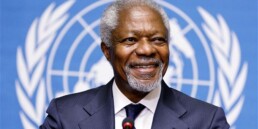
Sustainable Impact at a UN Initiative
”Maybe you know of Kofi Annan?” – was how a call we received in December started, initiating a collaboration with a United Nations initiative.
Ever since the inception of People Heart Business an important part of our DNA has been to dream big. Working with our long-term ambitions is not an exclusive piece of work for an executive management team, but for all of us at People Heart Business, and naturally integrated into our daily operations.
Being a newly founded company with aspirations to make a real impact on the business world in new ways, there is no ’off-the-shelf’ value proposition. It takes time to formulate and re-formulate what it is we are doing and who we are doing it with.
We have had extensive discussions on who our core customers and dream customers would be. Early on we decided to partner up with CEOs and Executives who share our values of collaborations enabling real impact. People and performance centric customers have always been on our list of dream companies to collaborate with, as well as organizations with strong purposes who shape the future. Already from the very beginning our team has said “Our dream is to get a call from UN saying, People Heart Business, we need your help”.
Imagine our surprise when the phone rang in December.
“Maybe you know of Kofi Annan? In 2000 he launched a United Nations initiative for a sustainable business world. Based on 10 principles for responsible business, this is today the largest corporate sustainability initiative in the world and has been critical for the global business community’s contribution to the 17 SDG. The focus has been high on this initiative within the UN and hence the work continues to scale.
I am calling on behalf of the person who runs this network in Sweden. They want support to secure scaling the success in a sustainable way. I am not sure if this is what you do, but I have followed your work and through contacts I have come to the conclusion this might be something for People Heart Business?”.
I don’t think we need to explain our reaction.
A few weeks ago we signed an agreement and we couldn’t be happier about this partnership opportunity. A dream for sure has come true.
It would be easy to say we will work extremely hard or do everything in our power to succeed with this incredibly important ask. But we would rather say – we will give it our best and practice what we preach to enable top-performance in a sustainable way!
To everyone involved in the matchmaking and realization of this collaboration, from the deepest parts of our hearts – THANK YOU!
Life at People Heart Business
Life at People Heart Business
Do you have to choose between pursuing your personal and professional dreams?

I’ve never stopped dreaming about spending several months traveling to new places, exploring different cultures and the natural wonders of the world. However, as a performance-oriented person truly enjoying work, with an urge to grow and make an impact in the business world, it hasn’t always been easy to follow those dreams. It is easy to get caught up in projects and tasks and years pass by focusing on company and client needs, and it is seldom a good time to ask for a longer time off, especially when having a central role in a growing business.
Fortunately, Klara Ljungqvist, the CEO of People Heart Business looks at this differently. Ever since I joined People Heart Business, I have had the opportunity to talk openly about ALL of my dreams. Even better, People Heart Business has encouraged me to dream even bigger and since I shared this dream with the team, it’s been followed up on many times – when is it time for your trip?
Yet, despite People Heart Business having a holistic perspective on life and happiness as a part of sustainable top performance, and one of our core values is dreaming big, it wasn’t easy to ask for 2.5 months off to go on adventures ”just for fun”. What about the team? What about our clients? What do I signal and how will this affect my role and my career?
Finally, during the fall, I decided it was time. I wanted to live in line with all my values and follow the dream of going on a 2.5 month long trip to South America with my husband. And what happened at work?
I received a tremendous amount of support and encouragement and was called a role model for living sustainable performance. During the trip I was forced to check out completely, with the team stepping up and taking over all my responsibilities.
I have myself, my team and our culture to thank for one of the best adventures of my life. I found that the support and opportunity to fully check out was the best medicine to increase my passion to contribute to work when coming back. For a person like me the problem isn’t motivation or loyalty – it is balancing high motivation and loyalty with other aspects of life to maintain it as years pass by. I want to be a role model showing that top performance in the business world can be combined with values of traveling, family, and doing other things you love.
I was welcomed back in the best way possible. I was surprised with flowers and heartwarming messages, but best of all – a prepared ”dream boarding”. People Heart Business wanted to learn about my experiences, insights, and dreams but also about my perspectives on the company having been away and coming back.
In summary, I’ve been positively reinforced and challenged to fulfill my personal dreams without having to worry about leaving the professional dreams behind and instead finding ways where these dreams can influence and reinforce each other.
Grateful for a lifetime – thank you! ❤
Felicia Grosin
COO & Management Consultant
Lead the Future 2023

LEAD THE FUTURE 2023
Turning the severe challenges facing our society into solutions is an overwhelming task. Business leaders have a big responsibility and a challenge to enable value creation from both a financial and a non-financial perspective, and the economic downturn and high inflation has increased the pressure on most.
It was both thought-provoking and heartwarming to come together and raise the gaze regarding how to take responsibility and lead the future. CEOs, Stanley Cup winners, world-leading researchers, thought leaders, rising stars, entrepreneurs, psychologists, engineers, doctors, and economists, what a privilege to learn from you all!
Some insights:
⭐ Businesses goals need to be aligned with societal contribution and global values. With Generation Z set to make up 27% of the OECD workforce by 2027, demands on successful DEIB work, purpose, and authentic leadership will inherently increase and businesses will need to take this into consideration. However, short-termism is still prevalent in the business world, and leaders must be incentivized and courageous to maintain a long-term focus and find ways to embrace broader value creation, rather than short-term financial performance.
⭐ Today, a quarter of the world population live in conflict-affected areas. However, polarization is not only present in wars and conflicts, but also in the business world and in all our companies. With globalization decreasing, the business world’s possibility to affect anti-democratic movements is diminishing. Polarization also limits our innovation power. Work on diversity and inclusion as well as bubble hopping is critical to solve the complex challenges.
⭐ Top performance and wellbeing are not contradictions – together, they are imperative to business success. Research from McKinsey revealed that organizations that successfully combined people and performance enjoyed 2x faster revenue growth than performance-driven companies during the pandemic. The future of business is to merge these perspectives, not only in your purpose, but also in your business strategy.
⭐ Even leading stars in the business world are humans. 1 in 8 people live with a mental health condition right now, and the trend is negative. It is time to re-design organizations to make them fit for the future and fit for people. The business world needs role models to show the way with human centric leadership at the highest level of organizations.
Deeply impressed by all the guests, your perspectives and not least your ability to contribute to an authentic and inclusive evening. Let’s scale hope!
Diversity & inclusion – “Nice to have” or a business imperative?

Diversity inclusion
– “Nice to have” or a business imperative?
Recently Allbright presented their report on Diversity in Swedish business. Even if the topic of diversity has become increasingly important for many organizations, change is slow.
According to the World Economic Forum (2023) it would still take approximately 130 years to close the inequality gap at the current pace, despite an increased global focus on gender diversity at work.
Many organizations and leaders are under extreme pressure due to the past years of pandemic, a financial downturn, technical advancements in society and higher expectations on sustainability. Even so, increasing pressure by adding DEI perspectives is necessary to be future ready and successful long-term.
In 2025, 75 percent of the workforce will be made up by millennials. According to Deloitte, DEI is one of their top two questions when assessing an employer. So not only does DEI have a positive effect on innovation, financial performance, and collaboration, it will also be critical to attract the workforce of tomorrow.
A global large cap organization reached out to People Heart Business for support in this area. Why us? A small startup, with little experience in DEI itself? We don’t know. But DEI leads the organization to larger questions. To work with DEI successfully the organization needs to center it in the business strategy, look at the performance of the executive management and CEO as well as the culture and leadership in the organization. The work needs to be done with integrity and in a way that builds trust and allyship throughout the organization. The partner needs to be capable of both handling complex logical and emotional challenges. We won the competition against international giants. It is a big responsibility and thus we partnered up with Chisom Udeze and Diversify – a consultancy with vast experience in DEI, with clients such as UN, the Economist and Boston Consulting Group.
To succeed we will always rely on the competence and trust of our clients, network, and partners.
We take humble pride in our purpose to unite people in solving the unsolvable!
What are your best tips when it comes to successful DEI-work?
Redefining Culture and navigating Change

Redefining Culture and navigating Change
One of our clients share, two years after our work ended, their view of the journey and what impact it has had since then.
In 2020 LMK Group faced a game changing event, merging three companies (Linas Matkasse, Ret Nemnt and Godtlevert Gruppen) in three different countries, effectively doubling the size of the company. This coincided with the Pandemic and lock down, giving them no chance to travel or meet physically. How to win synergies from three companies in this challenging situation?
According to McKinsey & Company, 70 percent of mergers fail and it’s mostly because organizations too often overlook or ignore organizational culture and human capital issues and pay scant attention to integrating these softer issues into the “hard” integration process.
It takes bold leadership, to in this situation embark on a journey and involve the entire organization in defining the success DNA of the new group. They were also brave in trusting Klara Ljungqvist, Alicia Smith and People Heart Business, a company that didn’t even have an e-mail address when we signed the contract.
Together with the entire organization we defined the purpose, strategy and culture of LMK Group, now Cheffelo. Doing it as a co-creation project between management, leaders and employees enabled strategic alignment, trust and allyship throughout the organization. Brita Helleberg and Felicia Grosin handed over the work to them two years ago with a successful launch event (filled with substance and engagement), a toolkit and trainings for all leaders to equip them to further build it into the organization and into their own leadership. It makes me proud and happy to see how Cheffelo have taken it onwards and upwards – to unleash the potential and leverage the synergies.
Walker Kinman and Martin Neerland, it was a pleasure to work with you and the group in such a trustful partnership. Headache, laughter and so much learning. And who would have known that you had so many talented actors and film directors? I am forever thankful that you trusted me and People Heart Business with this. It is this trust that has built People Heart Business. Today we have our own compass for our team and company.


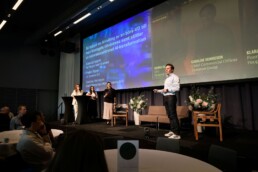

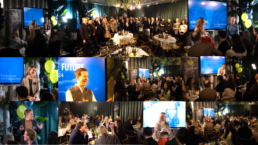
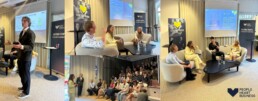
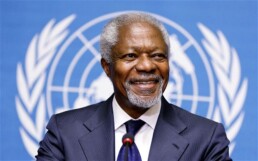


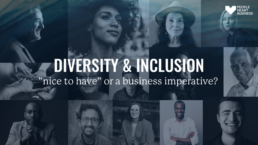

⭐C. Mikael Mattsson, CEO of svexa and Senior Researcher at Stanford University, spoke about the need for individualization in optimizing performance. Svexa has supported world class elite athletes. Mikael highlighted how personalized schedules can enhance productivity in the business world, noting that, some surgeons or executives might perform better at different times of the day as an example. As technology becomes more affordable, personalized optimization will become accessible not only to privileged people focusing on longevity but hopefully to make modern organizations fit for people.